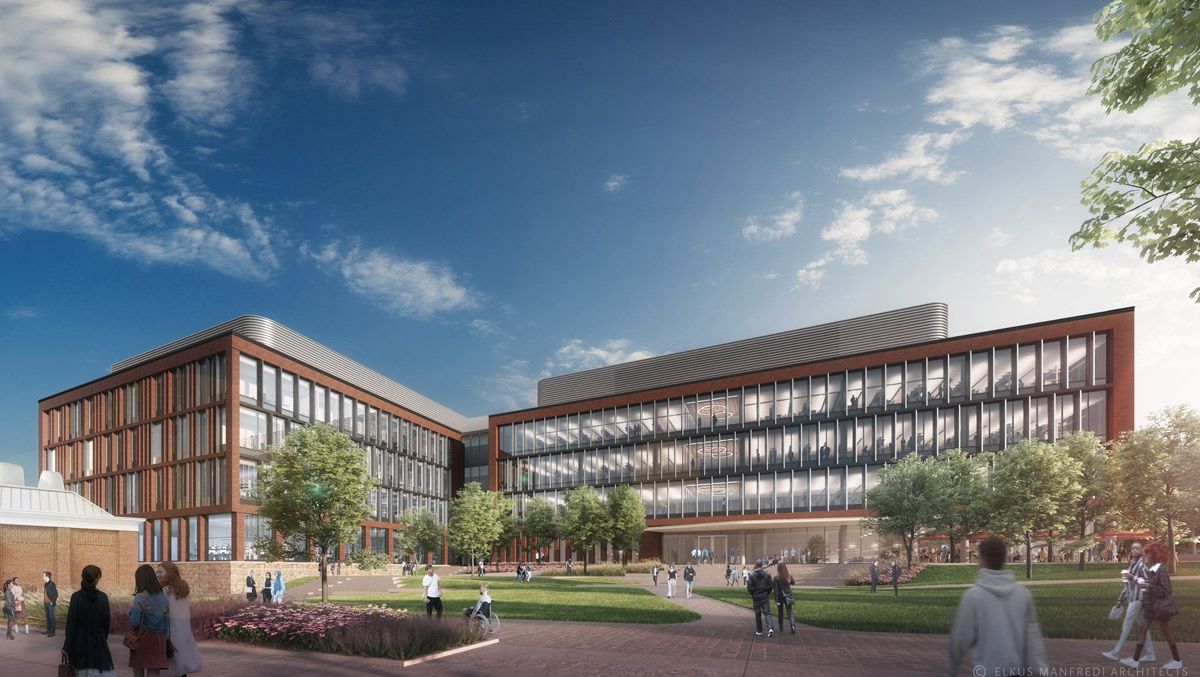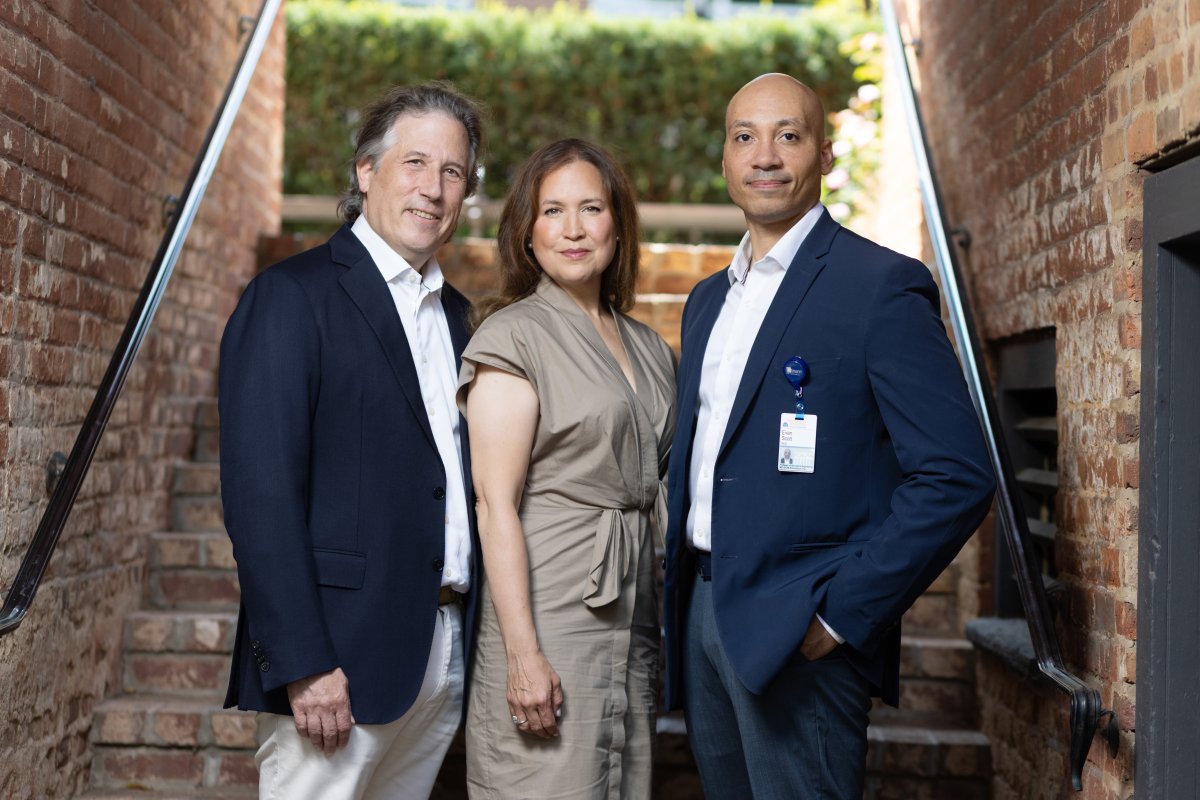Big Things, Small Packages
A few weeks after Evan Scott, PhD—a biomedical engineer and preeminent nanomedicine researcher—landed in Charlottesville to begin his new position as the director of UVA’s Institute for Nanoscale Scientific and Technological Advanced Research (nanoSTAR), he met face-to-face with two of his biggest supporters, David Goodman, PhD, and his wife, Mia. Scott will be nominated to the David Goodman Family Bicentennial Professorship in Nanomedicine, which was created with a generous commitment from the Goodmans and matching funds from the University’s Bicentennial Professors Fund. Scott was recruited from Northwestern University, where he spent more than a decade teaching and leading groundbreaking research on one of the most advanced and promising innovations in healthcare.
Nanomedicine is the design and use of molecular, atomic, or subatomic (i.e., nanoscale) materials and devices to diagnose, monitor, and treat diseases more accurately. Scott’s specialty is nanostructures that target inflammatory cells and the body’s immune responses to treat cancer, heart disease, and more. It’s work that epitomizes the big-things-in-small-packages proverb, and Scott is poised to make big things happen in nanomedicine research and development at UVA and beyond.
Scott succeeds the late Mark Kester as director of nanoSTAR. Before he sadly passed away in 2022, Kester was one of the nation’s leading experts in nanotechnology-based solutions for targeted drug delivery. His work included collaborating with UVA Cancer Center director Thomas P. Loughran Jr., MD, on new treatments for blood cancers and solid tumors. Dr. Loughran said Kester played a key role in helping the center achieve the National Cancer Institute’s Comprehensive Cancer Center designation in 2022.
“The potential of nanotechnology to improve and even transform cancer care has already become clear,” said Dr. Loughran. “We are excited to have Dr. Scott join UVA to help us improve cancer care for patients across Virginia and beyond.”
As a biomedical industry leader and longtime supporter of nanoSTAR, Goodman shares that excitement. He received his doctorate in pharmacology at UVA and currently serves as executive chairman of the Canadian pharmaceutical company Pharmascience, which has collaborated with nanoSTAR through an academic-industrial partnership. Goodman has supported nanoSTAR through the Morris and Rosalind Goodman Family Foundation, including funding the nanoSTAR Undergraduate Summer Research Program.
“UVA’s strengths in nanotechnology and drug discovery and development are well-known. I look forward to the next phase of nanomedicine research, education, and innovation with Evan Scott leading the program,” said Goodman. "Through interdisciplinary collaboration across UVA and with other academic institutions and industry partners, nanoSTAR is poised to revolutionize treatments for cancer and other diseases while cultivating the next generation of nanomedicine experts and pioneers," he said.

Scott has dual appointments at UVA’s School of Medicine and School of Engineering and Applied Science. Additionally, he was appointed the Thomas A. Saunders III Family Jefferson Scholars Foundation Distinguished University Professor. A University Professorship is a distinguished UVA faculty appointment established to facilitate cross-university collaboration and recognize excellence in a broad field of study.
As the director of nanoSTAR, Scott is tasked with fostering collaborative, interdisciplinary research on nanotechnology with additional faculty across the University, including at the Schools of Data Science and Arts and Sciences, and he will support UVA Cancer Center’s research mission. For example, he is already collaborating with and recently presented at the fall retreat of the Cancer Center’s Translational Orphan Blood Cancer Research Initiative (TOBCRI). TOBCRI scientists are pursuing new treatments for leukemias and lymphomas so rare the research community has historically neglected (orphaned) them. Among the TOBCRI’s most promising research and development efforts are nanomedicines and nanoscale drug delivery systems, which have been shown to increase the efficacy of precision targeted and immunological therapies for these rare cancers.
Finally, Scott will play an essential role in the Paul and Diane Manning Institute of Biotechnology—the University’s new state-of-the-art biomedical research, development, and manufacturing facility scheduled to open in late 2026. The Manning Institute will accommodate over 100 scientists and clinical researchers focused on advancing cutting-edge precision medicines, including cellular therapies, immunotherapies, and nanomedicine. It will also serve as a hub for industry partnerships to help commercialize their discoveries and get them to patients as quickly as possible.

All those aims are in Scott’s wheelhouse. Not only is he well-funded and well-respected as a teacher and scientist, holding multiple National Institutes of Health (NIH) grants and receiving both the NIH Director’s New Innovator Award and the National Science Foundation’s CAREER Award, but he is savvy about translating research discoveries into real-world applications. Scott holds 21 patents and is the founder and CEO of SNC Therapeutics Inc., an AbbVie portfolio start-up company focused on cancer nanotherapy.
“I am honored to be the new director of nanoSTAR and carry Mark Kester’s legacy of scholarship and innovation forward,” said Scott.
“I’m also incredibly grateful for the generosity of the Goodman and Saunders families,” he said. “Their support enabled me to join the renowned faculty at the Schools of Medicine and Engineering, and it’s allowing me to collaborate with exceptional scientists at UVA Cancer Center and across the University to expand my work at such an exciting time for biomedical research and development at UVA, especially with the launch of the Manning Institute of Biotechnology,” he said.
Learn how to support UVA Cancer Center’s groundbreaking research by contacting us at uvacancercenter@virginia.edu or 434-924-1871.

